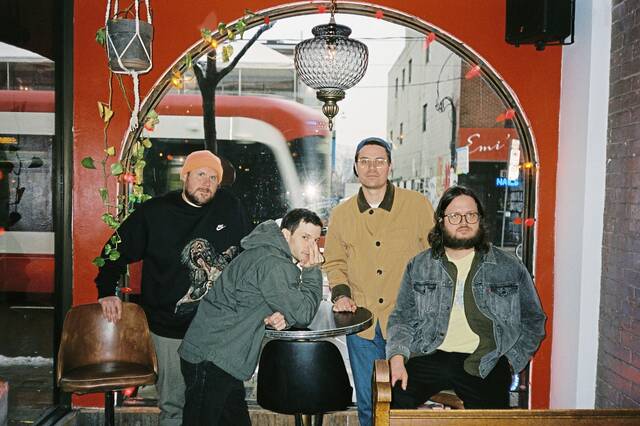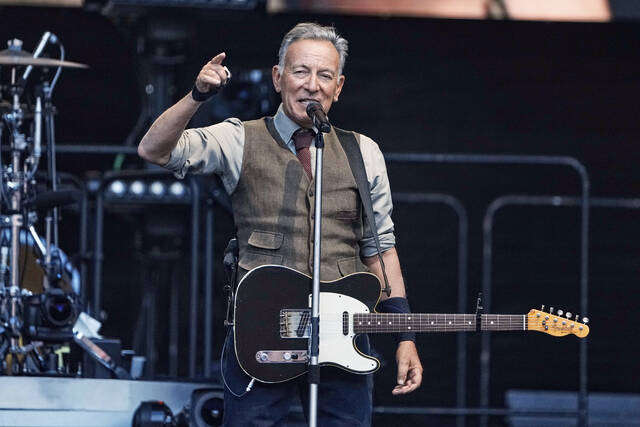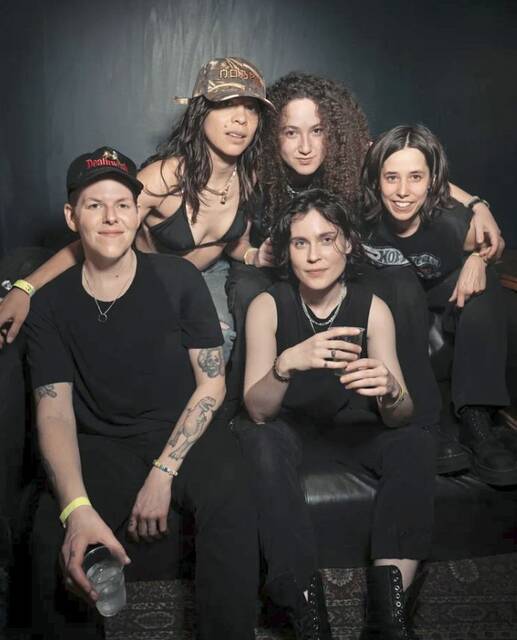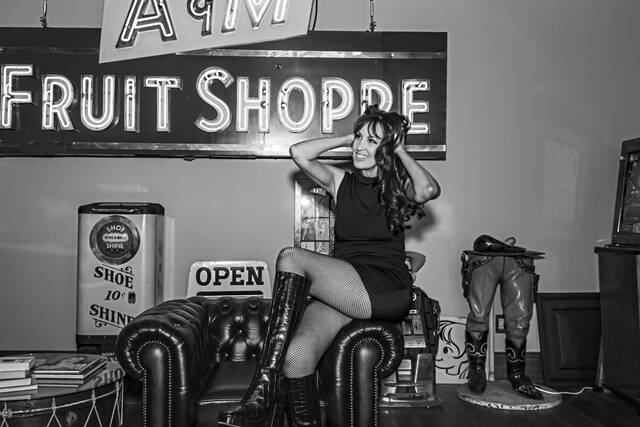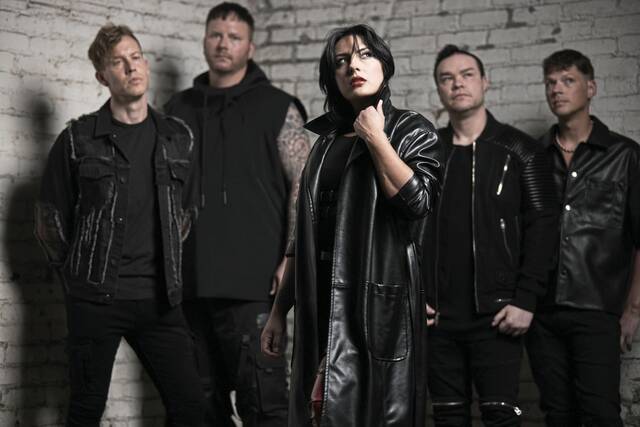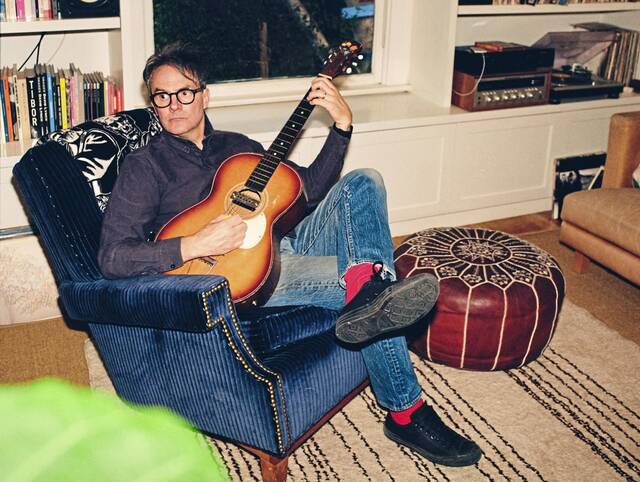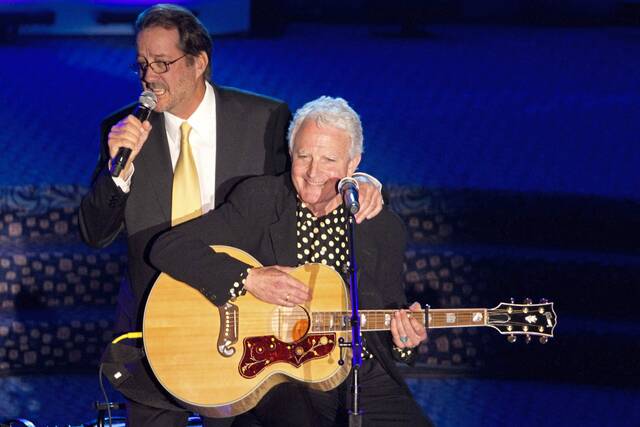PUP guitarist Steve Sladkowski already knows what he’s doing on the band’s off day before their show next week in Pittsburgh, and he won’t have far to go.
The Canadian punk rock band will play Stage AE on Sept. 8, and Sladkowski planned to walk a few blocks down to check out the Pirates the day before.
“It’ll be my first time to PNC (Park),” he said last week. “It’s one of the ballparks that I’ve not been to yet that are a close drive to Toronto. So I’m excited for that, too.”
Although Sladkowski had hoped for a Paul Skenes start, it doesn’t look like that’ll line up now. But the consolation is PUP — an abbreviation of Pathetic Use of Potential — getting to play in a city that feels close to home.
“We love Pittsburgh,” he said. “I love playing anywhere that feels very much like the Great Lakes, the extended Great Lakes world.”
PUP, which released its latest album “Who Will Look After the Dogs?” in May, will be joined by Jeff Rosenstock for their co-headlining Cataclysmic Rapture of Friendshipness tour, alongside Ekko Astral.
“Jeff is — I would say this even had we not been promoting a tour — one of my favorite people. He was at my wedding. We’ve known him for a long time,” Sladkowski said. “We go way, way back, and it’s a mutual admiration society, and we have some fun stuff planned. To be able to do this as long as we have been is amazing, but to be able to do it for as long as we have and also have made some of the closest friends that we have on the planet and get to do it with them too, it’s really exciting.”
In a Zoom call from Toronto, Sladkowski discussed the new album, surprising songs, house shows and more:
Pittsburgh is the fifth date on the tour, so what’s it like that early in the run? Are you up to full speed by then?
Yeah, I think as a band, especially for the four of us, we’ve been on the road all year. So it’s nice to be coming into a big tour and an exciting tour and feel like we’re in pretty good shape. I think of it a little bit like baseball. Spring training is one thing, but I feel like right now we’re in sort of the late regular season in terms of how we’re playing. There will always be little moments of chaos and, that’s part of what makes it special, I think. We do welcome chaos. So there will always be something crazy going on, but that’s part of it. And who knows, we’ll have some fun stuff, maybe mixing the bands together or something. We’ve been toying with some ideas that we’re just going to try out. So five shows into the tour, it may be perfect. It may be still flying by the seat of our pants. But either way, I think that’s sort of in the spirit of what our two bands are.
There’s a low-income ticket offer for this tour, so how important is it for you to make tickets accessible to everybody?
I think that stuff’s really important. I think, wherever you can, what we want is for people to be at the show and enjoy the show. And there are all kinds of different barriers, literal and metaphorical barriers, to entry for a lot of people. Income obviously is a primary one, like tickets are getting more and more expensive, so we do what we can to keep ticket prices low, but also these little moments, whatever we can do to kind of push it even further. It’s imperfect, right? We don’t have a way of enforcing it. It’s not like we’re asking for people’s tax stubs or whatever, which I think would be ridiculous anyway. But I think that’s a way of just hoping that people act in good faith and don’t snap up those tickets if they can afford what we think is a pretty reasonable cost upfront.
(“Who Will Look After the Dogs?”) came out in May, so what are your thoughts on it now that it’s been out there for a few months?
It’s been nice to see it as the year of touring has gone on, it’s been nice to see it growing and people starting to recognize. It’s always interesting. You never know which songs are going to connect with people from a new record. We know what songs from the old records people really love and some that maybe we like them, but they don’t go over as well and whatever the case may be. But it’s been nice to see how the new record is growing with people and to feel like, the thing about making a record is some of these songs, from our perspective, are already old, so to speak. We’ve been working on them for two years, in some of these cases.
So, to see people reacting to them and feeling excited and singing along, that actually gives you a new perspective and a new insight into a lot of the music where you feel like maybe once you’ve recorded it and it’s done and the record’s about to come out, you’re kind of like, not done with it, but you have to find something else in the songs to feel fresh and feel excited, and a big part of that is kind of letting them go, right? When you put a record out, it ceases to be yours, which I think actually is very freeing. Now that these songs are out there, people are responding and it’s been great.
What have been the songs that have surprised you that the crowds latched on to that maybe you weren’t expecting?
There’s a song called “Hunger for Death” on the new record that we were all pretty proud of just because we thought it was an interesting exercise in not trying to sound like the band necessarily. We had all these ideas for different production on it and using different sounds and kind of took it in different directions on the recording. And then playing it live, we were like, OK, this might go over well. It’s not going to sound exactly the same as it does on the record, but maybe that’ll be OK, or we’ll play it a bunch of times and people won’t connect with it, and that’s fine. And, at this point, we play it every night, and people have been really excited. There’s a lyric “(expletive) everyone on this planet” that people really love to shout along to, so it’s cool. You just see there’s little moments there.
I think a song like “Concrete” also is connecting with people. People seem more and more excited. We’ve been playing that one for a while. And initially, we were just kind of sound checking with it, before the record had come out, and all of our crew and some of the people that we were on tour with at the time, sort of end of last year, were like, ‘What is that song? That sounds great, you should play it a lot.’ And so that’s always a good sign, too. So we have been forcing that one into the setlist, basically every day. It’s nice to see that our crew was right, like people really like the song.
It’s always nice to feel like we have so much music now. This is five records plus an EP. I never thought that it would get this far, honestly, not in a cynical way or anything, but I think no matter how grandiose you might want your goals to be when you’re first starting out a band, like for us, I don’t think we ever thought that we would have five records of material to pull from, rather than, OK, maybe one day we’ll get to tour and just like run around. So not only to have five records, but to have material that people still want to sing along to and listen to when it’s new, it’s really so much more than we ever expected.
This album came together pretty quickly over three weeks. How do you think that shorter timeframe helped the album?
For us in the past, obviously, as you said, this is a lot shorter than any other period of time we’ve made a record. And I think the thing about it was, A., we were just a better band, where we’ve been doing this for a long time. It takes less time to do certain things, whether that’s get takes or even to write songs, whatever the case may be. I think one of the things that we had found a part of our process that was kind of not idiosyncratic – I’m sure other people struggle with it too – was just overthinking. By compressing the amount of time we actually booked to make the record, I think it forced us to not overthink. Decisions just had to be made, because that was the day that we were working on the song. And if we needed to go back, we could, but you have a lot of songs you want to record. And you have to make those decisions and stand by them and embrace a little bit of discomfort that comes with that.
I think it was a really positive and fruitful approach. I think we were all a little bit concerned, like, oh, maybe we won’t do this in time. And maybe we’ll have to book more studio time, whatever, whatever. And John Congleton, who made the record, to his credit was like, ‘no way, we’ll be fine. Stop, don’t worry about it.’ The last couple of days in the studio, we were sort of standing around like, OK, that’s it. We’re done. I hear that still when I practice the songs before we go on tour or the times that I listen back to the record, that’s audible to me that there was some discomfort and there was a little bit of an intensity. I hear some of that discomfort and that sort of energy, that we had to be quick and decisive, just in a way that I think is charming and was a good learning experience for us.
One description of the last album, “The Unraveling of PUPTheBand,” called it the most PUP record. So where does that put this one?
I mean, every PUP record is the most PUP record, I think, just by virtue of the fact that at some point we’ve realized, I can’t pinpoint when this was, but it’s like, the band is so much about the four of us and how our four distinct personalities and tastes combine in this fractured and sometimes antagonistic way. There’s only one way we know how to work and that’s with the four of us treating it very much like a job and not in a bad way, but just in like, that’s the work, right? You tour and you write and you record and then you tour and then you tour some more and you write and record. I think just being comfortable with that and that it’s the four of us as a family and needing to be open with each other and try and grow as guys in our mid- to late-thirties.
If we want to keep doing this and we all do, we need to continue being each other’s support systems, continue having difficult conversations when we have to have difficult conversations and also doing stuff that’s enjoyable and that’s fun and getting to tour with Jeff. I think that the Pirates are playing the day that we have a day off in Pittsburgh. So it’s like, yeah, go to a baseball game, trying to have fun and enjoy those moments. When we were in Australia last month, we had a day off before we flew home and we went to Rottnest Island, which is where the little quokkas are, those cute little animals. You’ve got to do stuff like that just to keep perspective on things and to keep enjoying it.
I think this record is one where we tried, and I don’t know that we fully succeeded. I think if you always succeeded in stuff that you set out to do in making a record, there would be no impetus to make another record. But try to embrace how kind of chaotic and difficult and also fun and crazy it can be to be in a band and to be doing this for as long as we have with the other three people in this band are three of the closest friends that I’ve ever had. I guess that every PUP record is some reckoning with that. So this is only another saga, I suppose. (laughs) Or another chapter in the saga.
Related
• Q&A: Guitarist Daniel Donato says Pittsburgh feels like home for his Cosmic Country sound• Jerry Cantrell talks new solo album, Pittsburgh memories, not wanting to mess up at Ozzy Osbourne's final show
• 2025 Pittsburgh area concert calendar
In July you played six shows in Toronto at all different venues. What was it like playing a house show again? Do you miss those days at all?
I do and I don’t. We were laughing about this. Obviously there’s no way to recreate the intimacy that comes with playing on someone’s patio or playing a house show or playing in a small venue that holds 150 people. I think we played Mr. Smalls in Pittsburgh many times, way back. Venues like that, nothing compares to that. But you also get to the point of when it is your job and you appreciate some of the comfort that comes with some of the larger venues. Even if that’s just a (crappy), dingy couch in a green room for you to have 10 seconds to check your phone and text your wife or whatever. I miss the immediacy. I miss the power, but I also won’t pretend like I don’t also enjoy having a green room that has a shower and a reliable internet connection. (laughs)
A little bit of comfort compared to sleeping on the floor…
That’s right. We did that for a long, long time. I had some friends up from Montreal, some old friends that we toured with for a long time, for Oasis (last week). It was nice to do that. But, it’s like all of us realizing now we’re like in our thirties and forties, it’s like, OK, you guys can sleep at my place on the couch for a night and we’re all cool with that. But to do this for six weeks the way we used to, I think my body would break down.


